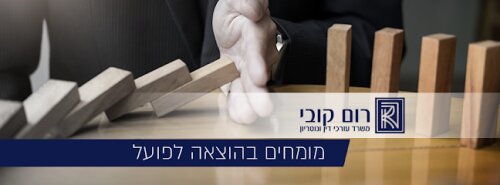Best Creditor Lawyers in Ramat Gan
Share your needs with us, get contacted by law firms.
Free. Takes 2 min.
List of the best lawyers in Ramat Gan, Israel
About Creditor Law in Ramat Gan, Israel
Creditor law in Ramat Gan, Israel, governs the legal rights and remedies available to individuals and businesses that are owed money by others. This area of law covers the process of collecting debts, securing assets, enforcing court judgments, and protecting the interests of creditors in insolvency or bankruptcy proceedings. Ramat Gan, being part of the greater Tel Aviv District, adheres to Israeli national laws and court procedures but may have specific local practices and court departments dealing with creditor cases. Understanding these laws can help both individual and commercial creditors navigate the process more effectively and increase the likelihood of successful debt recovery.
Why You May Need a Lawyer
There are many situations in which individuals or businesses in Ramat Gan might find themselves needing legal assistance related to creditor issues. Some common scenarios include:
- Difficulty collecting an unpaid debt from another individual or company.
- Disputes over the terms of a loan, promissory note, or credit agreement.
- Enforcement of a court judgment when a debtor refuses to pay.
- Representation in insolvency or bankruptcy proceedings when a debtor cannot meet their obligations.
- Negotiating settlements, payment plans, or restructuring of debts.
- Defending against allegations of unfair or unlawful collection practices.
- Advising on legal steps to secure debts, such as placing liens or charging orders on assets.
In all these cases, a lawyer familiar with creditor law in Ramat Gan can help you understand your rights, prepare needed documentation, represent you in court or negotiations, and work towards a favorable outcome.
Local Laws Overview
Creditor law in Ramat Gan is primarily governed by a combination of Israeli national legislation and local court infrastructure. Key laws and procedures relevant to creditors include:
- Execution Law, 1967 - This law outlines the main procedures for the enforcement of judgments and debt collection, including the role of the Execution Office (Hotzaa Lapoal).
- Bankruptcy and Insolvency Law, 2018 - Establishes processes for bankruptcy of individuals and companies, creditor rights, and debt arrangements.
- Contracts Law, 1973 - Governs the enforceability of credit agreements and loans.
- Interest Restriction Law - Sets legal limits on interest and other charges on debts to protect both creditors and debtors from unfair practices.
- The Execution Office in Ramat Gan handles the registration and enforcement of monetary and non-monetary judgments, asset seizures, wage garnishments, and more.
- Israeli courts have procedures to assist creditors in tracing assets, examining debtors, and compelling payment where possible.
It is important for creditors to follow proper legal procedures, as improper collection actions can result in legal penalties or loss of rights.
Frequently Asked Questions
What is the first step in collecting a debt in Ramat Gan?
Usually, the process begins with a formal demand letter sent to the debtor. If there is no response or payment, the creditor can file a claim with the Execution Office or the relevant court.
Can I charge interest on a debt owed to me?
Yes, but there are legal limits to the amount of interest and penalties that can be charged under Israeli law. Interest rates must comply with the law for legal enforceability.
What is the Execution Office (Hotzaa Lapoal) and what does it do?
The Execution Office is a government body responsible for enforcing court judgments and other enforceable documents, such as checks and promissory notes. It can take actions like asset seizure, wage garnishment, and travel bans against debtors.
What are my options if the debtor has no money or assets?
If the debtor is insolvent, you may need to participate in bankruptcy proceedings to seek a portion of whatever is recovered. Sometimes creative legal strategies or settlements can result in partial repayment.
How long does it take to collect a debt through legal channels?
The time frame can vary based on the complexity of the case, the debtor's cooperation, and the court's workload. Some cases are resolved in months, while contested or difficult cases can take longer.
Can I recover my legal expenses as a creditor?
In many cases, the court can order that the debtor pays some or all of the creditor's legal fees and costs, if the claim is successful.
Is it legal to contact the debtor directly?
Yes, but all contact must comply with Israeli law, including restrictions on hours of contact and methods of communication. Harassment or threatening behavior is prohibited and can lead to liability.
What happens if a debtor ignores a court order or judgment?
The Execution Office can take enforcement actions such as freezing bank accounts, seizing property, or even imposing travel bans until the debt is paid.
Do I need an attorney for creditor matters?
While not always legally required, an attorney can significantly improve your chances of recovery, ensure compliance with legal procedures, and minimize risks of mistakes that could harm your case.
Can creditors act collectively in Ramat Gan?
Yes, especially in insolvency or bankruptcy cases, creditors may act together to improve their chances of recovery through creditor committees or collective legal actions.
Additional Resources
- Execution Office (Hotzaa Lapoal) Ramat Gan: Handles the enforcement of judgments and debt collection proceedings.
- Israeli Courts (Beit Mishpat Shalom Ramat Gan): Local magistrate courts with jurisdiction over civil and creditor disputes.
- Ministry of Justice - Insolvency and Trustee Authority: Oversees bankruptcy and insolvency proceedings for both individuals and companies.
- Israeli Bar Association: Provides referrals to qualified lawyers specializing in creditor law.
- Nonprofit Debt Counseling Services: Several organizations offer debt advice and mediation for creditors and debtors.
Next Steps
If you believe you need legal assistance related to creditor matters in Ramat Gan, it is recommended to:
- Gather all relevant documents, such as contracts, payment records, correspondence, and court judgments, before seeking advice.
- Contact a qualified lawyer with experience in creditor law to assess your specific situation and recommend the best legal strategy.
- If your case is straightforward and the debt is uncontested, you may be able to initiate proceedings at the Execution Office yourself, but professional guidance is strongly advised.
- If you are involved in a more complex or disputed creditor case, legal representation is crucial to protect your interests and maximize your chances of recovery.
- Keep detailed records of all communications, actions taken, and expenses incurred while attempting to recover your debt.
Remember, Israeli creditor law is nuanced, and prompt action often improves your chances of successful debt recovery in Ramat Gan.
Lawzana helps you find the best lawyers and law firms in Ramat Gan through a curated and pre-screened list of qualified legal professionals. Our platform offers rankings and detailed profiles of attorneys and law firms, allowing you to compare based on practice areas, including Creditor, experience, and client feedback.
Each profile includes a description of the firm's areas of practice, client reviews, team members and partners, year of establishment, spoken languages, office locations, contact information, social media presence, and any published articles or resources. Most firms on our platform speak English and are experienced in both local and international legal matters.
Get a quote from top-rated law firms in Ramat Gan, Israel — quickly, securely, and without unnecessary hassle.
Disclaimer:
The information provided on this page is for general informational purposes only and does not constitute legal advice. While we strive to ensure the accuracy and relevance of the content, legal information may change over time, and interpretations of the law can vary. You should always consult with a qualified legal professional for advice specific to your situation.
We disclaim all liability for actions taken or not taken based on the content of this page. If you believe any information is incorrect or outdated, please contact us, and we will review and update it where appropriate.









